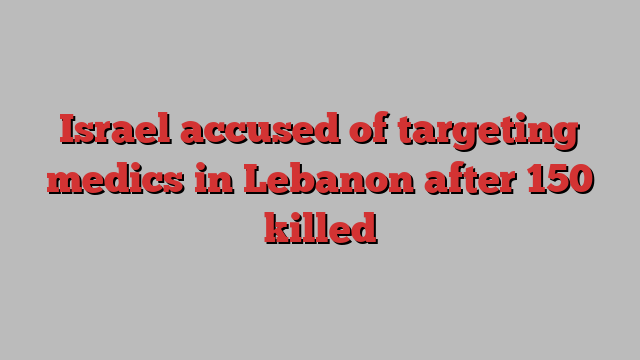
Israeli strikes have killed more than 150 medical and rescue workers in Lebanon and hit dozens of health facilities, a pattern one Lebanese minister alleged to be “systematic targeting” of healthcare.
Direct Israeli strikes, mainly over the past three weeks, have incinerated ambulances, destroyed civil defence centres and battered wings of hospitals as Israel’s military has intensified its campaign against Hizbollah.
The effect has been debilitating for the country’s medics. Several paramedics told the Financial Times that strikes hit just in front of their ambulances as they raced towards the scene of attacks, forcing them to turn back and abandon the wounded.
Others described direct strikes on their teams as they were resting in break rooms or had been dispatched to the scene of earlier attacks. Hospitals have also been forced to shut because of strikes. Of the five hospitals along the southern border, only one remains open.
Lebanon’s public health minister Firas Abiad alleged the strikes were “attacks on civilians”. “There’s no other explanation for what they are doing,” he told the FT. “These are war crimes.”
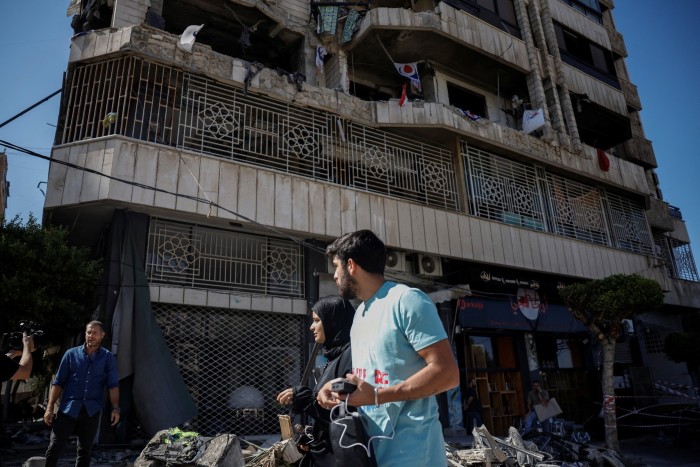
The minister said at least 150 medical personnel, mostly first responders, have been killed and 231 wounded, largely in the past three weeks. More than 135 vehicles have been destroyed by Israeli air strikes, while 13 hospitals and dozens more medical facilities have been bombed.
Many of those hit have been from the Islamic Health Committee, a major healthcare provider in Lebanon that is affiliated with the militant group Hizbollah. But workers and facilities from other organisations and government bodies have also been hit.
Israel accuses Iran-backed Hizbollah and its ally, the Amal movement, of using “civilian infrastructure” and emergency vehicles to transport “operatives and ammunition”, claims that both groups deny.
“Any vehicle shown to contain armed operatives with the intent to carry out terrorism, regardless of the type of vehicle, is a military target,” the Israel Defense Forces said on Saturday.
The attacks on health workers came as Israel pummelled Lebanon with thousands of air strikes in an escalating campaign against Hizbollah that has killed much of the militant group’s leadership since last month.
First responders and ambulances were, in many instances, prevented from reaching wounded survivors of Israeli air strikes, according to health workers, local officials, the IHC and Amal. Health minister Abiad said the strikes were “effectively denying life-saving care” to the injured.
Walid Hashash, director of the operations unit of Lebanon’s civil defence force, said: “Sometimes we’ll be driving in the ambulance and they strike in front of the ambulance, which we take to mean: ‘If you keep driving, you’ll die. Go back.’”
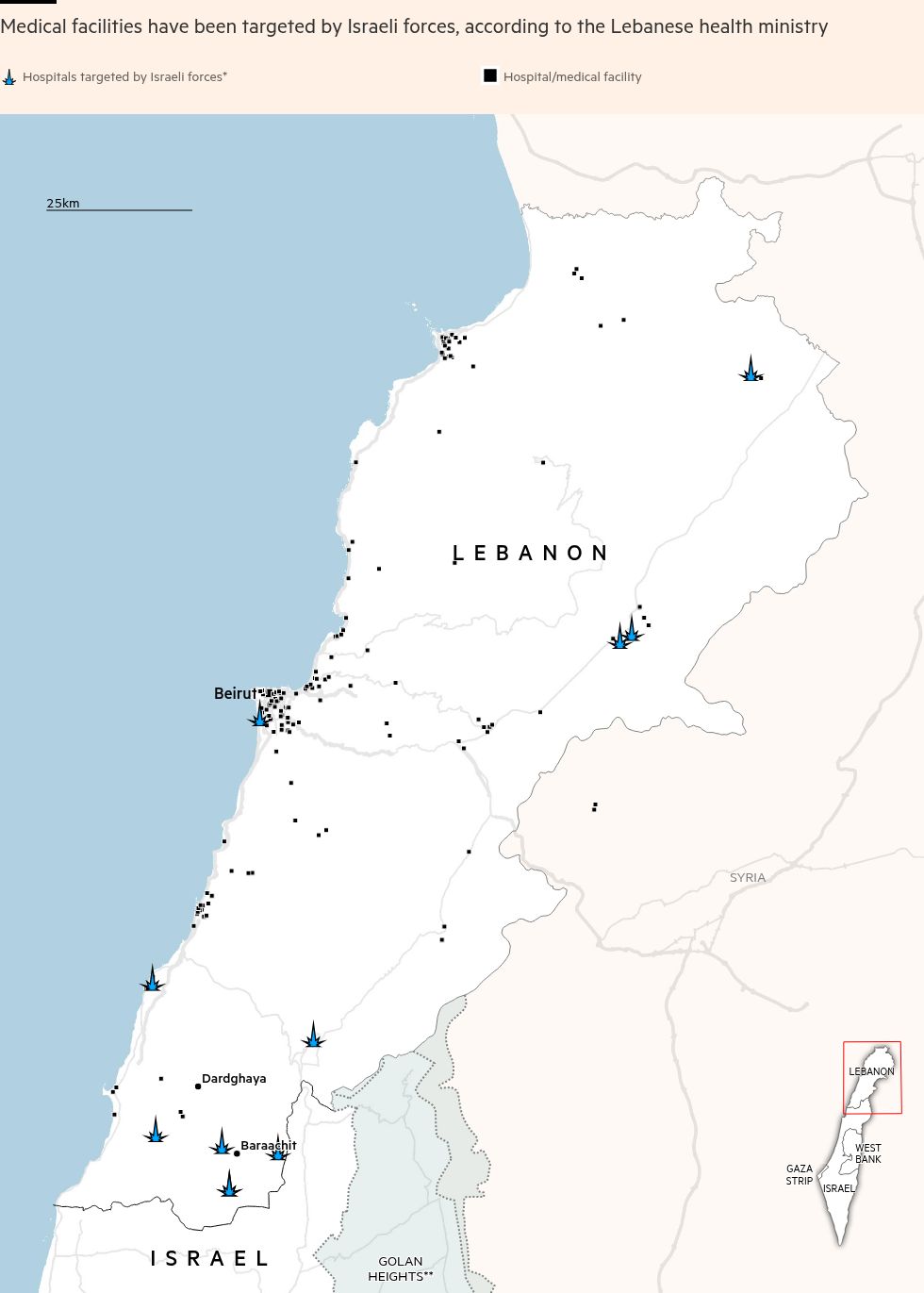
One attack hit a second wave of response vehicles attempting to retrieve the bodies of eight IHC rescue workers, who were killed on October 2 while attempting to reach the site of an air strike on the southern village of Taybeh.
When the Lebanese Red Cross, escorted by the Lebanese army, attempted to recover the dead the next day, Israel struck near their convoy, killing an army soldier and wounding four paramedics, according to the Lebanese Red Cross and Lebanese army. The bodies of the eight rescuers lay in the street for days, said Mahmoud Karaki, spokesperson for the IHC civil defence.
About half the workers and facilities hit this year were linked to the IHC, which operates separately from Hizbollah’s armed wing but co-ordinates with it closely for rescue operations. It serves Hizbollah’s base, providing healthcare to hundreds of thousands of people across the country.
The IHC said it had lost more than 80 rescue workers in the past year, with 70 in the past three weeks. Amal’s Al Risala Scout Association said it had lost 21. “Every morning, we wake up and ask who among us is still alive,” Karaki said.
Government hospitals and state rescue workers have also been struck, and they are affected by the attacks on the IHC, which is woven into Lebanon’s emergency response system.
“They’re targeting civil defence, the Lebanese Red Cross, the Lebanese paramedics’ association — any paramedic group that is moving on the ground has been targeted,” Abiad said. “Even if you want to accept their premise about the IHC, what is the explanation for targeting civil defence or the Lebanese Red Cross?”
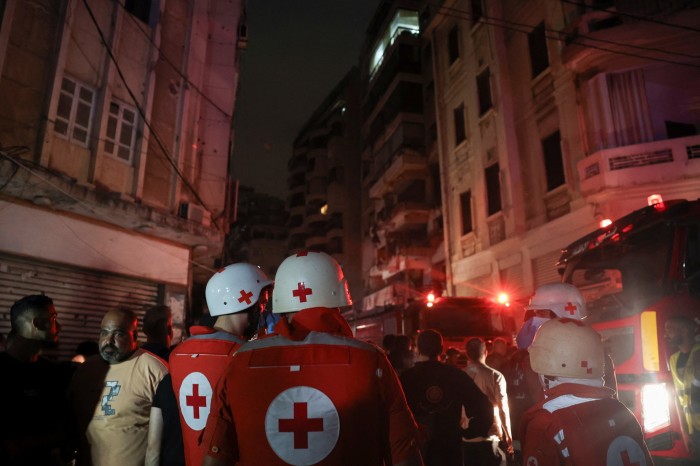
Ramzi Kaiss, Lebanon researcher at Human Rights Watch, said: “Membership or mere affiliation with Hizbollah is not a sufficient basis for determining an individual to be a lawful military target. Medical personnel, including those assigned to Hizbollah-affiliated civil defence organisations, are protected under the laws of war. Intentionally directing an attack against medical units and ambulances would be a war crime.”
Mohammad Sleiman, director of the IHC Martyr Salah Ghandour hospital in southern Lebanon, said he was given four hours to clear out paramedics stationed in his hospital before it would be struck by Israel on October 4.
Sleiman raced to move the paramedics out of the building. But 90 minutes before the 10pm deadline, three Israeli shells landed on the hospital in quick succession, hitting the doctors’ break room, shattering laboratory equipment and injuring 10 staff, Sleiman and a local official told the FT.
“We would have expected them to strike around the hospital to get us to leave,” Sleiman said. “But to hit it directly? We did not imagine even they would go that far.”
The IDF said notices were sent to residents before the strike and significant figures in the village were warned that Israeli forces believed Hizbollah were utilising hospitals in defiance of the laws of armed conflict. The IDF only acknowledged striking a mosque adjacent to the hospital that they said was being used by Hizbollah fighters “as a command centre”.
Medical staff have not returned to Salah Ghandour hospital since the strikes.
On the same day in nearby Marjaayoun, a Christian-majority town on the border, an Israeli missile hit an ambulance parked in front of the government hospital, killing seven IHC paramedics and shutting down the hospital, according to two hospital officials, Abiad and Karaki. The IDF said it was unaware of this strike.
Chouchan Mazraani, the head of the hospital’s emergency department, was drinking coffee outside the emergency room when the ambulance was hit.
Mazraani began to run towards it and was so close she could hear the wounded men, who were old colleagues. But another doctor stopped her. “Come back, they’re going to strike again,” he shouted.
Mazraani froze. “I was standing in the middle of the road and I was powerless,” she said. “Imagine, someone is crying for you and you don’t dare to get closer because you don’t want to be struck.”
Israeli strikes have also hit state-run facilities directly. On October 9, five Lebanese state rescue workers were killed when Israel struck their base in the annexe of a church in the southern village of Dardghaya. The IDF said that it had targeted “several terrorists from the Amal terrorist organisation” in the village. Three men affiliated with the Shia organisation were killed nearby in the same attack.
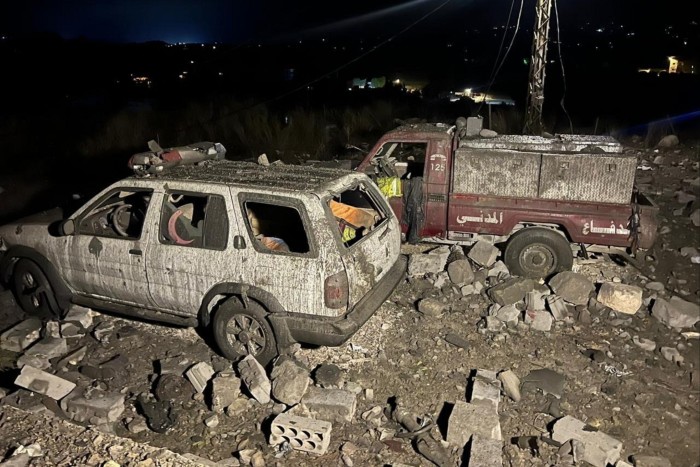
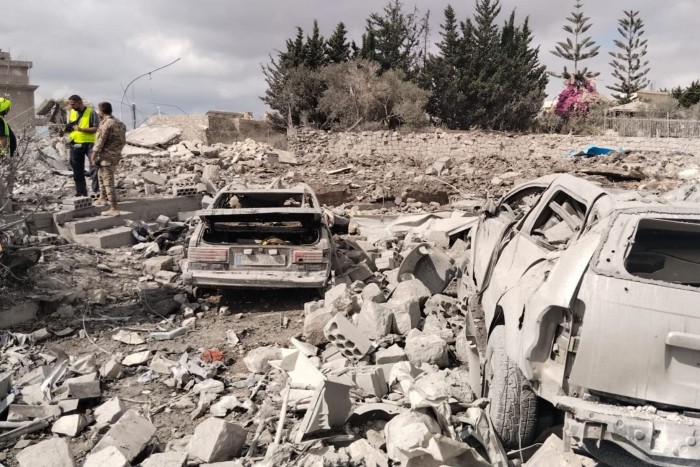
Days before, the rescue workers, who were members of Amal’s political movement but worked for the state, had received a new ambulance, refurbished and paid for by grassroots donors.
In a separate incident a few days before, an Israeli strike hit a civil defence station in the southern village of Baraachit, killing 14 firefighters, the town’s mayor said. The building belonged to the union of municipalities for the region of Bint Jbeil. The IDF said the “precise, intelligence-based strike” targeted Hizbollah operatives, who were allegedly using the fire station as a “military post”.
As soon as the shells began landing on Salah Ghandour hospital, staff called the Lebanese army and Red Cross, asking them to help co-ordinate with the Israeli military through the UN and evacuate the injured staff.
But Israel’s military never responded to calls from Unifil, the UN peacekeeping force in Lebanon, according to three people familiar with the situation.
Fearing further Israeli strikes, the staff of Salah Ghandour instead evacuated their wounded colleagues themselves, closing the hospital and loading the patients into their own cars.
Additional reporting by James Shotter. Cartography by Hirofumi Yamamoto and Steven Bernard